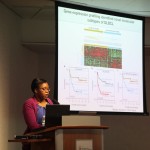Quantitative Understanding in Biology
This course prepares students to apply quantitative techniques to the analysis of experimental data and the modeling of biological systems. Topics include: practical aspects of data formatting and management; graphical, mathematical and verbal communication of quantitative concepts; a review of statistics, with emphasis on the selection of appropriate statistical tests, the interpretation of results, and the design of experiments; the formulation, evaluation, and analysis of mathematical models… more
Scientific Computing in Biomedicine
This course will teach students the fundamental skills and knowledge required for scientific computing in the biomedical sciences. Topics to be covered include scripting, working with large datasets, data and software management, and effective use of high-performance computing resources. Students will learn relevant theory as well as develop practical application skills using a number of contemporary tools and technologies including R for data analysis and presentation, SQL databases for structured data management, the Ruby scripting language for practical programming tasks, git for software and data revision control, Sun Grid Engine for batch job management on large clusters, and Maestro from the Schrödinger Suite for molecular modeling and visualization.
Quantitative Genomics and Genetics
This course covers the fundamentals of statistical methodology, including a rigorous treatment of analysis techniques used to understand the genetics of complex phenotypes when using genomic data. The course focuses on the central importance of generalized linear models in quantitative genomics with an emphasis on both Frequentist and bayesian computational approaches to inference… more
Clinical and Research Genomics
In this course, students build a strong foundation of knowledge of NGS technologies (both existing and emerging), learn the applications of these technologies for basic and clinical research, and learn the essential tools for the analysis, integration, and application of these data relative to other public databases and phenotype repositories… more



